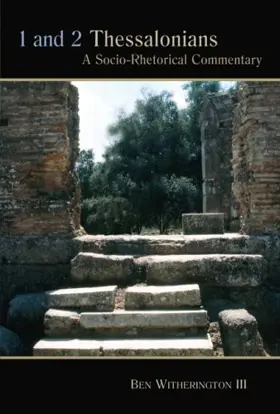

1 and 2 Thessalonians: A Socio-Rhetorical Commentary
in Socio-Rhetorical Commentary
Pages
286
Publisher
Eerdmans
Published
2006
ISBN-13
9780802828361
Collections
This book appears in the following featured collections.
- Ultimate Commentary Collection: NT Expositional by John Glynn
- The Pastor’s Bookshelf by Scot McKnight
Reviews
Witherington applies his “socio-rhetorical” method to the Thessalonian epistles.
[Full Review]
Ben Witherington has written a series of "socio-rhetorical" commentaries on a good number of New Testament books. Some are better than others, and his volume on the Thessalonian letters is one of the better ones. The primary benefit of reading Witherington's commentaries is the wealth of contextual background information he provides.
[Full Review]
This illustrious New Testament professor at Asbury Seminary is closing in on his goal of having written commentaries, most of them sociorhetorical, on every book (or small groups of books) in the New Testament. His offering on the two Thessalonian letters is more substantial than most of his efforts, devoting almost as much attention to their eight chapters as he does, say, to Mark’s sixteen or 1–2 Corinthians’ twenty-nine. His introductory conclusions largely match traditional evangelical commentary. Paul is writing around 50–51 from Corinth, with his co-workers, in light of a comparatively brief time spent in Thessalonica planting the church there. That time ended in fierce Jewish opposition and has spawned persecution from Jew and Gentile of the fledgling Christian church in town ever since. Second Thessalonians should not be viewed as pseudonymous; epistles were the one main genre of the day for which we have by far the smallest amount of evidence of Jewish or Greco-Roman acceptance of pseudonymity, and none whatever in Christian circles. The arguments against Pauline authorship, like those for reversing the chronological order of what we have come to call 1 and 2 Thessalonians, are comparatively weak.
[Full Review]
As with his other commentaries in the sociorhetorical series, Ben Witherington maintains that we cannot ignore Greco-Roman rhetoric when we examine the epistles of the apostle. Indeed, the Greco-Roman world was inundated with rhetoric, and Tarsus, Paul’s hometown, was an intellectual center in serious competition with the likes of Athens and Alexandria. One would be surprised if Paul was not fluent in the arts of persuasion. A cursory examination of Paul’s letters quickly reveals that the apostle was a competitor in the game. His extant letters use rhetoric to stimulate and encourage his churches as well as to discount the arguments of his opponents. At times, Paul even goes so far as to attack the integrity of manipulative rhetoricians, while at the same time defending his use of rhetoric as honorable (2 Cor 10; Gal 1:7–10; 1 Thess 2:3–7). Witherington convincingly demonstrates that Paul’s first letter to the Thessalonians is an example of epideictic rhetoric and that the second letter to the church is an example of deliberative rhetoric. In the introduction, Witherington goes to some length to illustrate that Malherbe’s recent commentary (2000) makes a false dichotomy between parenesis and rhetoric. Malherbe largely ignores rhetoric in these letters and prefers to categorize them as parenetic letters. In so doing, Malherbe dismisses the apocalyptic and rhetorical upshot of the message.
[Full Review]






